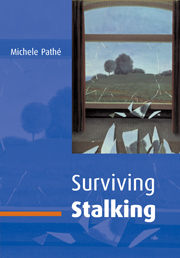Book contents
- Frontmatter
- Contents
- Acknowledgments
- Introduction
- 1 What is stalking?
- 2 How common is stalking?
- 3 Who stalks?
- 4 Could I be assaulted?
- 5 Can stalkers be treated?
- 6 Who are the victims of stalking?
- 7 The impact of stalking
- 8 Reducing your chances of victimization
- 9 Evading the stalker
- 10 Navigating the criminal justice system in the United States of America
- 11 Navigating the criminal justice system in the United Kingdom
- 12 Navigating the criminal justice system in Australia
- 13 Should I just disappear?
- 14 How do I deal with the emotional impact of stalking?
- 15 How you can assist victims of stalking
- Conclusions
- References
- Reading guide
- Appendix 1 Other resources
- Appendix 2 Protection from Harassment Act 1997
- Appendix 3 Sample restraining order under Protection from Harassment Act 1997
- Appendix 4 Criminal justice system flow chart, UK
- Index
14 - How do I deal with the emotional impact of stalking?
Published online by Cambridge University Press: 04 September 2009
- Frontmatter
- Contents
- Acknowledgments
- Introduction
- 1 What is stalking?
- 2 How common is stalking?
- 3 Who stalks?
- 4 Could I be assaulted?
- 5 Can stalkers be treated?
- 6 Who are the victims of stalking?
- 7 The impact of stalking
- 8 Reducing your chances of victimization
- 9 Evading the stalker
- 10 Navigating the criminal justice system in the United States of America
- 11 Navigating the criminal justice system in the United Kingdom
- 12 Navigating the criminal justice system in Australia
- 13 Should I just disappear?
- 14 How do I deal with the emotional impact of stalking?
- 15 How you can assist victims of stalking
- Conclusions
- References
- Reading guide
- Appendix 1 Other resources
- Appendix 2 Protection from Harassment Act 1997
- Appendix 3 Sample restraining order under Protection from Harassment Act 1997
- Appendix 4 Criminal justice system flow chart, UK
- Index
Summary
Support organizations and self-help groups
Support organizations can provide emotional support, information and advice to victims, and they can refer victims to specialist treatment services when additional support is required. There are organizations specifically for stalking victims in the UK and North America, and the Internet is also a good source of information on support organizations. Try the search term ‘stalking’. Appendix 1 lists the major international support organizations for stalking victims, as well as contact details for your nearest victims of crime support/assistance service. These organizations offer advice to victims of crime in general, and they can also refer you to agencies which can assist specific subgroups of stalking victims, such as domestic violence services for the victim of a ‘rejected’ stalker.
Your local victims of crime agency can also advise you on the availability of self-help and support groups for stalking victims in your area. You may wish to start your own – ask the victim agencies if they have the names of any stalking victims who are willing to be contacted by other victims. Speak with your local council, church or victims of crime support services about a suitable, secure venue.
Even if a regular group seems too ambitious or impractical at this stage, you may want to consider forming a peer network, which will place stalking victims in contact with each other, providing emotional support and an opportunity to exchange information and strategies.
- Type
- Chapter
- Information
- Surviving Stalking , pp. 123 - 126Publisher: Cambridge University PressPrint publication year: 2002



